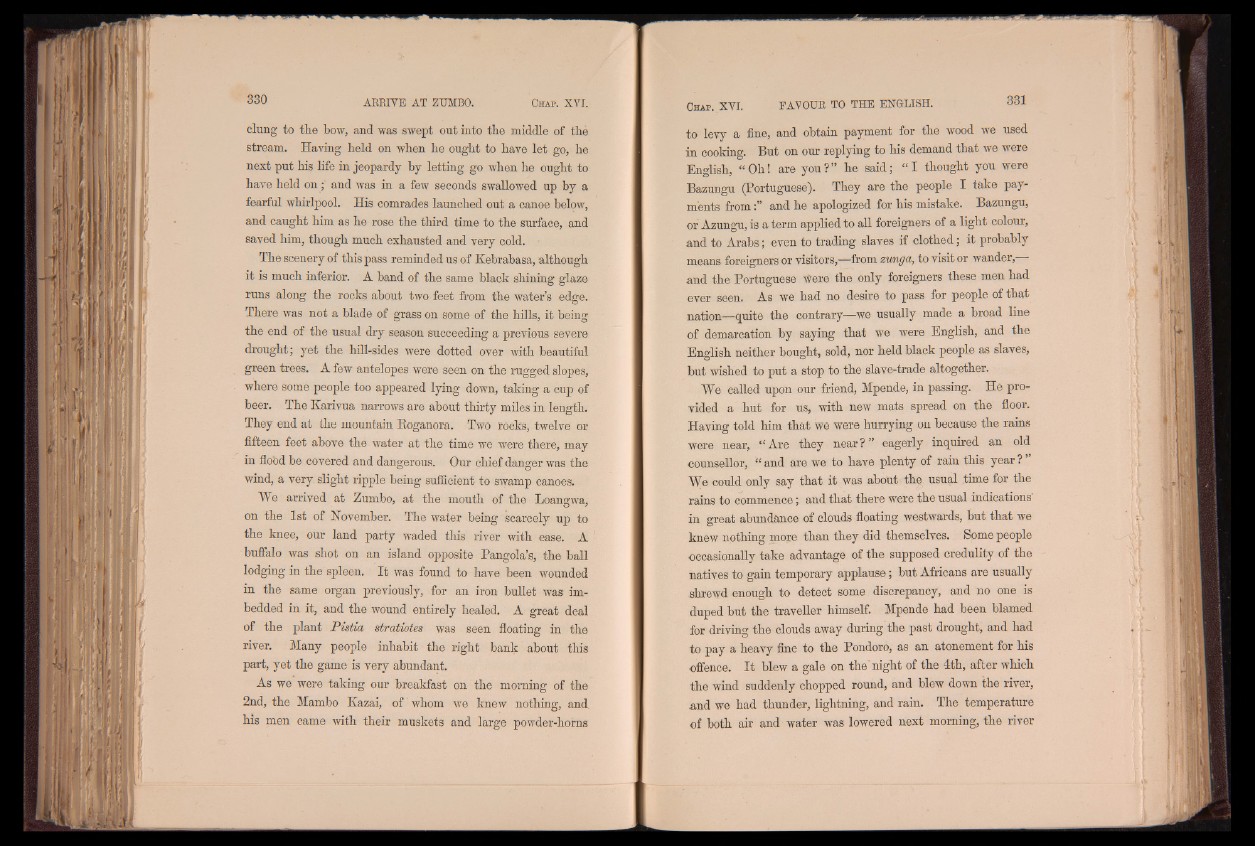
clung to the bow, and was swept out into the middle of the
stream. Having held on when he ought to have let go, he
next put his life in jeopardy by letting go when he ought to
have held on ; and was in a few seconds swallowed up by a
fearful whirlpool. His comrades launched out a canoe below,
and caught him as he rose the third time to the surface, and
saved him, though much exhausted and very cold.
The scenery of this pass reminded us of Kebrabasa, although
it is much inferior. A band of the same black shining glaze
runs along the rocks about two feet from the water’s edge.
There was not a blade of grass on some of the hills, it being ' } O
the end of the usual dry season succeeding a previous severe
drought; yet the hill-sides were dotted over with beautiful
green trees. A few antelopes were seen on the rugged slopes,
where some people too appeared lying down, taking a cup of
beer. The Karivua narrows are about thirty miles in length.
They end at the mountain Eoganora. Two rocks, twelve or
fifteen feet above the water at the time we were there, may
in flood be covered and dangerous. Our chief danger was the
wind, a very slight ripple being sufficient to swamp canoes.
We arrived at Zumbo, at the mouth of the Loangwa,
on the 1st of November. The water being scarcely up to
the knee, our land party waded tliis river with ease. A
buffalo was shot on an island opposite Pangola’s, the ball
lodging in the spleen. I t was found to have been wounded
in the same organ previously, for an iron bullet was imbedded
in it, and the wound entirely healed. A great deal
of the plant Pistia stratiotes was seen floating in the
river. Many people inhabit the right bank about this
part, yet the game is very abundant.
As we were taking our breakfast on the morning of the
2nd, the Mambo Kazai, of whom we knew nothing, and
his men came with their muskets and large powder-horns
to levy a fine, and obtain payment for the wood we used
in cooking. But on our replying to his demand that we were
English, “ Oh! are you?” he said; “ I thought you were
Bazungu (Portuguese). They are the people I take payments
f r om a n d he apologized for his mistake. Bazungu,
of Azungu, is a term applied to all foreigners of a light colour,
and to Arabs; even to trading slaves if clothed; it probably
means foreigners or visitors,—from zungct, to visit or wander,
and the Portuguese were the only foreigners these men had
ever seen. As we had no desire to pass for people of that
nation—quite the contrary—we usually made a broad line
of demarcation by saying that we were English, and the
English neither bought, sold, nor held black people as slaves,
but wished to put a stop to the slave-trade altogether.
We called upon our friend, Mpende, in passing. He provided
a hut for us, with new mats spread on the floor.
Having told him that we were hurrying on because the rains
were near, “ Are they n ear?” eagerly inquired an old
counsellor, “ and are we to have plenty of rain this year ?
We could only say that it was about the usual time for the
rains to commence; and that there were the usual indications
in great abundance of clouds floating westwards, but that we
knew nothing more than they did themselves. Some people
occasionally take advantage of the supposed credulity of the
natives to gain temporary applause; but Africans are usually
shrewd enough to detect some discrepancy, and no one is
duped but the traveller himself. Mpende had been blamed
for driving the clouds away during the past drought, and had
to pay a heavy fine to the Pondoro, as an atonement for his
offence. I t blew a gale on the'night of the 4th, after which
the wind suddenly chopped round, and blew down the river,
and we had thunder, lightning, and rain. The temperature
of both air and water was lowered next morning, the river